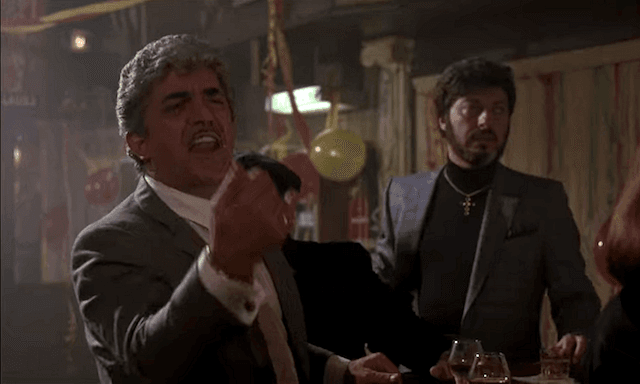'Key Scene' is a feature series on entertainment.ie where we look at a key scene from movies, how it locks into the overall story, and why it works so well that we're talking about still to this day.
'Goodfellas' is a movie made up of set-pieces.
There's the opening set-pieces of Henry's early life, describing how a bust-out works, to the extended Steadicam shot entering the Copacabana, right through to the Lufthansa Heist, the fallout from that, and beyond to the coke-addled finale set to Harry Nilsson's 'Jump Into The Fire'.
Yet, almost about a third of the way through, the movie pumps the breaks for about five minutes and gives itself over to a scene in which Tommy DeVito turns on Henry Hill over a simple comment of how funny he is. The scene opens with Tommy telling a story of a bank heist, how he's repeatedly pulled over by cops, all of it told to a chorus of laughter that comes abruptly to a halt when Henry simply remarks that he's funny.
There's zero change in the camerawork, nothing at all in the setup differentiates itself from the rest of the scene, but the shift is unmistakable and the air is just sucked out of the room in a flash. Scorsese's camera still works over the shoulder for each reaction, but the tension is unbearable. That's how it works when around someone who is clearly unhinged like DeVito - everyone around him is on eggshells, overtly laughing to keep his deranged anger at bay, and the release of breath when he drops the joke.
Yet, where that scene ends without bloodshed for Hill, another similar scene occurs later on in the movie which shifts the story into a downward angle. Up until now, the movie and Henry Hill's career has been on the upward trend, all of it glamour and success, yet here, in the scene with Billy Batts and DeVito, it's done in the dark, in a dimly-lit, sleazy bar. It begins inconspicuously, with the introduction of Billy Batts "breaking a few balls" about Tommy's shine box as he celebrates his release from prison. Yet, before long, it ends with him being viciously stabbed beaten to death by both DeVito and Jimmy Conway, played by Robert DeNiro.
It also slots in the opening of the movie, as we realise that the man we see Tommy, Jimmy and Henry brazenly stab and murder at the beginning of the movie is the very same movie, marking the turning point in the story from when Henry grew up wanting to be a gangster, to when he became one.
For all the glamour, the suits, the wild lifestyle, and the dark excitement of it, these are violent people with absolutely no qualms about knifing other people in the back or in the front. Even Hill, who didn't get involved other than by helping lock up the place as they did the deed, isn't innocent of it. The scene not only captures just how brutal and unforgiving they were but how they were more than capable of turning on one another in a split second. What's even more horrifying is that it's largely accurate to what happened in real-life.
According to Nicholas Pileggi's 'Wiseguy', which formed the basis of 'Goodfellas', DeSimone - the character on which Pesci's character was based - had the same interaction with Batts about his shine box at a lounge owned by Jimmy 'The Gent' Burke, who was the source of Robert DeNiro's character.
Billy Batts - real name William Bentvena - did crack a joke about DeSimone shining shoes as a child, but the eventual murder didn't happen for another two weeks, on June 11th, 1970 - the same date referenced in the movie. Hill recalls that DeSimone pistol-whipped Batts at the end of the night and beat Batts to death, shouting "Shine these f*cking shoes!" as he did so.
Batts' murder, just like in the movie, did eventually lead to the disappearance of DeSimone some nine years later, again all of it with frightening accuracy. Numerous stories exist of who killed precisely DeSimone, with the real Henry Hill stating that it was John Gotti who shot DeSimone, luring him into safety by telling him that he was going to be "made".
'Goodfellas', throughout the movie, was incredible for how it pinwheeled from comedy to terror in a matter of seconds, yet because we're removed from it as an audience, we never quite grasp the fact that it's with a basis of fact. The Billy Batts scene is a stark reminder that while the details may have been slightly altered, the end result was the same.









































































